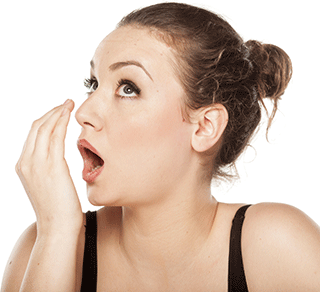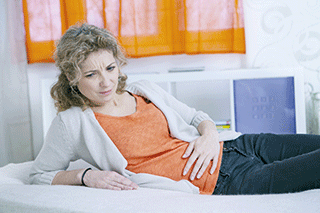The unmentionables

Some health complaints can’t help but make you blush, from constipation to thrush and diarrhoea. But fortunately there are natural ways of helping these embarrassing conditions
Thrush
“Thrush is a yeast infection caused by a fungus known as Candida albicans that lives throughout the body,” explains Primrose Matheson, a naturopath and founder of Primrose’s Kitchen (primroseskitchen.com)
“We always have this fungus in us but most of the time the fine balance of this bacteria is such that it doesn’t prove to be a problem. However, when we become stressed, the alkalinity of our body changes, it becomes more acidic and this can provide a better environment for this fungus to proliferate. Antibiotic use can upset the balance of flora too. If you couple this with a high sugar intake (as candida feeds off sugar) the imbalance can increase and become a serious problem. The main symptoms of thrush include itching and soreness around the entrance to the vagina and thick, clumpy, white, discharge. Natural treatments include using a garlic clove as a suppository whilst you sleep at night and coconut oil or natural yogurt as a soothing cream.
But my main advice is to boost the immune system and look for any emotional triggers or stresses in your life that can be removed. Increase food sources of vitamin C but stay away from all fruits apart from berries, which have the high vitamin and antioxidants and the lowest sugar levels. Stay away from all refined foods and concentrate on a diet of fresh vegetables and pulses as much as possible. Also avoid any non-organic meat or dairy as the hormones in non-organic meat and dairy can act like sugar to feed the Candida. Drink plenty of water and make sure you have a good intake of fibre to flush out toxins, antibiotics and non-beneficial bacteria. After exercise wash and change underwear immediately as a warm, humid environment is just what thrush thrives in.”

Bad breath
“About one in four people regularly suffer from halitosis,” says Shani Shaker, a registered nutritional therapist (www.superradiance.co.uk) “Unless you have rotten teeth or gums, bad breath often has nothing to do with the mouth, which is why breath fresheners don’t help.
One of the most common causes is low stomach acid (HCl) which leads to poor digestion, so food may be fermenting in your stomach and making your breath smell. If you are regularly stressed, take antacids, or antibiotics, have hypothyroidism, pernicious anaemia (impaired absorption of B12), had a recent stomach bug (Helicobacter pylori) or are deficient in niacin, chloride, sodium, potassium, zinc and/or iodine, you may have inadequate levels of stomach acid.
A simple test* to assess whether you have low stomach acid is, on an empty stomach, add one teaspoon of bicarbonate of soda to a glass of water. To stimulate your stomach acid think about food for several minutes. Then drink the contents of the glass and wait 10-15 minutes. If acid is present it will react with the bicarbonate producing carbon dioxide, resulting in burping. If there is no effect then acid levels may be low. If you are low, HCl is available in capsules, in the form of betaine hydrochloride. Take 300mg with each meal. However, do not take HCl if you have, or suspect you may have, a stomach ulcer – the two do not mix! Also, as stress interferes with the body’s HCl production, relax as much as you can, especially when you eat and chew your food well.”
*This test can sometimes induce diarrhoea. This is a normal consequence of the test and you should not worry if this happens.
Diarrhoea
“Diarrhoea describes an urgency to defecate and loose watery stools,” explains Shani Shaker.
“There are many possible causes including food allergy, gut inflammation, over-excitation of the gut muscles, stress and infection. Generally diarrhoea passes within a day or two and is nothing to worry about, however, in some instances it may be a warning sign of a more serious condition. Always see your GP if you have diarrhoea that contains blood, lasts more than four weeks, comes on in the night or is accompanied by abdominal pain, nausea and vomiting, fever, or weight loss.
Eat lightly-cooked vegetables, fish, non-gluten grains (rice, millet, corn and quinoa). Avoid potential allergens such as wheat, dairy, coffee and alcohol for 10 days to see if this makes a difference. Essential fats and glutamine calm gut inflammation. Antioxidants help the body detoxify and the right mineral balance helps the muscles of the gut to work properly. A high strength multi-vitamin and multi-mineral will help replace any lost nutrients.”

Constipation
“When you are constipated, passing stools becomes more difficult and less frequent than usual,” explains Joannah Metcalfe, consultant aromatherapist at Base Formula (www.baseformula.com). “Symptoms include dry, hard, lumpy stools that may be abnormally large or small. You may find yourself straining to go and feel that your bowel isn’t completely empty after going. You may also suffer from excess wind, stomach ache/cramps, bloating, nausea and loss of appetite. Simple dietary and lifestyle changes can be effective.
Try increasing roughage by eating more fresh fruit and veg, particularly lightly steamed, leafy green vegetables, brown rice, porridge oats and white meat/fish rather than too much red meat. Include prunes with your porridge and take two to three pieces of good quality liquorice daily. Senna pods can help to gently stimulate your digestion, as can drinking two litres of water daily. A good quality probiotic can also help to normalise bowel regularity. Relaxation therapies such as aromatherapy can be helpful too. Try a full body massage with 30ml grapeseed oil, four drops of sweet orange, two drops of lime, one drop of cinnamon and one drop of palmarosa – pay particular attention to the abdominal area, working in a clockwise rotation to stimulate the peristaltic action of the gut.”
Loss of libido
Loss of libido is one of those subjects that we tend to keep hush hush. However, according to the Great British Female Health Survey, conducted by Pharma Nord, one in 10 women have admitted that a lack of sexual desire has affected their wellbeing. Furthermore, statistics reveal that one in four of us has experienced a lack or loss of sex drive during our lifetime. The good news is that simple lifestyle changes can be made to enhance your libido and put a spark in your relationship.
Get active
Research shows that women who exercise regularly feel better about their bodies and have more energy. Exercise releases hormones, such as endorphins and dopamine, which can help to increase sex drive.
Supplement your sex drive
Sixty three per cent of women suffer from some form of sexual dysfunction, including a lack of desire, arousal issues and problems lubricating and achieving orgasm. However, clinical studies have shown that natural ingredients such as French pine bark, rose hip extract and amino acids may help to improve sexual desire, pleasure and comfort. Omega 7 can also help with intimate dryness, frequently experienced by women during the menopause.
Focus on you
Try eating a healthier, more balanced diet, taking regular exercise and focusing on your attributes rather than your perceived flaws.
For free advice on improving your libido in a natural way, visit www.ladyprelox.co.uk or email [email protected]